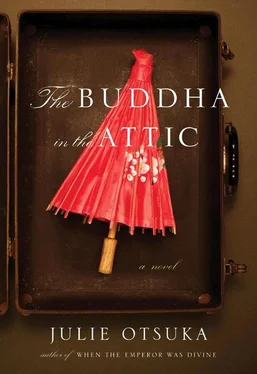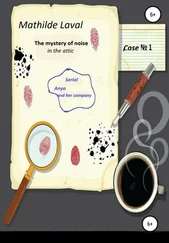THEY GAVE US new names. They called us Helen and Lily. They called us Margaret. They called us Pearl. They marveled at our tiny figures and our long, shiny black hair. They praised us for our hardworking ways. That girl never stops until she gets the job done . They bragged about us to their neighbors. They bragged about us to their friends. They claimed to like us much more than they did any of the others. No better class of help can be found . When they were unhappy and had no one to talk to they told us their deep, darkest secrets. Everything I told him was a lie . When their husbands went away on business they asked us to sleep with them in their bedrooms in case they got lonely. When they called out for us in the middle of the night we went to them and lay with them until morning. “Hush, hush,” we said to them. And, “Please don’t cry.” When they fell in love with a man who was not their husband we kept an eye on their children while they went out to meet that man in the middle of the day. “Do I look all right?” they asked us. And, “Is my skirt too tight?” We brushed off invisible specks of lint from their blouses, retied scarves, adjusted stray locks of hair so they hung just so. We plucked out their grays without comment. “You look beautiful,” we said to them, and then we sent them on their way. And when their husbands came home in the evening at the usual hour we pretended not to know a thing.
ONE OF THEM lived alone in a run-down mansion on top of San Francisco’s Nob Hill and had not been outside in twelve years. One of them was a countess from Dresden who had never lifted up anything heavier than a fork. One of them had fled from the Bolsheviks in Russia and every night she dreamed she was back in her father’s house in Odessa. We lost it all . One of them had used only Negroes before us. One of them had had bad luck with the Chinese. You have to keep an eye on them all the time . One of them made us get down on our hands and knees every time we scrubbed her floor instead of using a mop. One of them grabbed a rag and tried to help us but only ended up getting in our way. One of them served us elaborate lunches on fine china plates and insisted that we sit down with her at the table, even though we were anxious to get on with our work. One of them never changed out of her nightgown until noon. Several of them suffered from headaches. Many of them were sad. Most drank. One of them took us downtown to the City of Paris department store every Friday afternoon and told us to pick out a new item of clothing. Whatever you like . One of them gave us a dictionary and a pair of white silk gloves and enrolled us in our first class in English. My driver will be waiting for you downstairs . Others tried to teach us themselves. This is a bucket. This is a mop. This is a broom . One of them could never remember our name. One of them greeted us warmly every morning in the kitchen but whenever she passed us outside on the street she had no idea who we were. One of them barely said a word to us in the thirteen years that we worked for her but when she died she left us a fortune.
WE LIKED IT BEST when they were out having their hair done, or eating lunch at the club, and their husbands were still away at the office, and their children not yet home from school. Nobody was watching us then. Nobody was talking to us. Nobody was sneaking up on us from behind as we were cleaning her fixtures to see if we’d missed any spots. The whole house was empty. Quiet. Ours. We pulled back curtains. Opened windows. Breathed in the fresh air as we moved from one room to the next, dusting and polishing their things. All they see is the shine . We felt calmer then. Less afraid. We felt, for once, like ourselves.
A FEW OF US stole from them. Little things, at first, which we did not think they would miss. A silver fork here. A saltshaker there. The occasional swig of brandy. A beautiful rose-patterned teacup we just had to have. A beautiful rose-patterned saucer. A porcelain vase that was the same shade of green as our mother’s jade Buddha. I just like pretty things . A handful of change that had been sitting out on the counter for days. Others of us, though tempted, kept our hands to ourselves, and for our honesty we were well rewarded. I’m the only servant she’ll let upstairs in her bedroom. All the Negroes have to stay down below in the kitchen .
SOME OF THEM dismissed us without any warning and we had no idea what it was we’d done wrong. “You were too pretty,” our husbands would tell us, even though we found it hard to believe this was true. Some of us were so inept we knew we would not last more than one week. We forgot to cook their meat before serving it to them for supper. We burned their oatmeal every time. We dropped their best crystal goblets. We threw out their cheese by mistake. “I thought it was rotten,” we tried to explain. “That’s how it’s supposed to smell,” we were told. Some of us had trouble understanding their English, which bore no resemblance to what we had learned in our books. We said “Yes” when they asked us if we would mind folding their laundry and “No” when they asked us to mop, and when they asked us if we’d seen their missing gold earrings we smiled and said, “Oh, is that so?” Others of us just answered “Um-hmm” to whatever they said. Some of us had husbands who had lied to them about our abilities in the kitchen— My wife’s specialties are chicken Kiev and vichyssoise —but it soon became apparent that our only specialty was rice. Some of us had grown up on large estates with servants of our own and could not tolerate being told what to do. Some of us did not get along well with their children, whom we found aggressive and loud. Some of us objected to what they said about us to their children when they did not realize we were still in the room. If you don’t study harder, you’ll end up scrubbing floors just like Lily .
MOST OF THEM took little notice of us at all. We were there when they needed us and when they did not, poof, we were gone. We stayed in the background, quietly mopping their floors, waxing their furniture, bathing their children, cleaning the parts of their houses that nobody but us could see. We spoke seldom. We ate little. We were gentle. We were good. We never caused any trouble and allowed them to do with us as they pleased. We let them praise us when they were happy with us. We let them yell at us when they were mad. We let them give us things we did not really want, or need. If I don’t take that old sweater she’ll accuse me of being too proud . We did not bother them with questions. We never talked back or complained. We never asked for a raise. For most of us were simple girls from the country who did not speak any English and in America we knew we had no choice but to scrub sinks and wash floors.
WE DID NOT mention them in our letters to our mothers. We did not mention them in our letters to our sisters or friends. Because in Japan the lowliest job a woman could have was that of a maid. We have quit the fields and moved into a nice house in town, where my husband has found employment with a family of the first rank. I am putting on weight. I’ve blossomed. I’ve grown half an inch. I wear underwear now. I wear a corset and stockings. I wear a white cotton brassiere. I sleep in until nine every morning and spend my afternoons out of doors with the cat in the garden. My face is fuller. My hips have widened. My stride has lengthened. I am learning how to read . I am taking piano lessons. I have mastered the art of American baking and recently won first prize in a contest for my lemon meringue pie. I know you would like it here. The streets are wide and clean and you do not have to take off your shoes when you walk on the grass. I think of you often and will send money home as soon as I can .
Читать дальше












